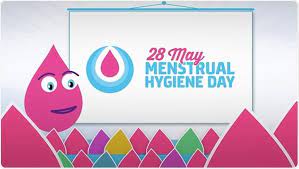Anannaya K Sangra
Our lives are more in oblivion today than they have ever been – thanks to social media, films, and television. We have mastered the art of flexing while leading a life very different from reality. Look at women’s lives for example. It enrages me when I see the commercials showing happy girls doing all the physical exercises while they are on their monthly cycles. Today being the Menstrual Hygiene Day (MH Day), I thought, is just the right occasion to bring up this issue. To those who have heard little or nothing about it so far, MH Day is a global advocacy platform that brings together the voices and actions of non-profits, government agencies, individuals, the private sector, and the media to promote good menstrual health and hygiene (MHH) for all women and girls. The day was initiated by the German non-profit WASH United in 2013.
Menstrual Hygiene Day
Coming back to the point I was making, while menstrual hygiene product companies sell their brands on the lines of ‘happy periods, happy girls’, the reality could well be very different for those menstruating. There may be some of them who could well be chirpy before, during, and after the periods; most of the women go through a rough phase month after month. Bloating, nausea, cramps, and extreme pain are some of the many experiences they have. Needless to say, this takes a toll on their overall output and performance. Skipping schools and taking a break becomes an absolute necessity for some of them. It’s good to have a positive representation on all media platforms but to my mind, that often sends a wrong message. A girl who may be experiencing a different reality while menstruating than that being portrayed could put herself in a comparative framework and have a negative image of herself. It could well be disempowering and demeaning for a person like me because we are personally made to feel as if the fault lies within us.
It’s time we realize that periods aren’t as glamorous as we see in commercials. Although my parents being far ahead of their times greeted me when I hit menarche and the day was marked with flowers, cakes, and photographs and I was made comfortable, the reality remains different for every girl and woman out there. This is true not only because of our different backgrounds but because we all have different bodies. Conditions like Endometriosis, Premenstrual Syndrome (PMS), Premenstrual Dysphoric Disorder (PMDD), and Polycystic Ovary Syndrome (PCOS) are more common than we think. Most commercials fail to talk about dysmenorrhoea and other extreme issues that women generally face. What is being portrayed about women’s lives is quite the opposite of what they are living.
Expressing discomfort due to periods is also seen as being dramatized. This is merely because we still don’t talk about the issue openly in our society and have clouded its representation on screen. Commercials also fail to bring out the fact that menstruation is not only limited to women. There are some Trans- men and non-binary folks who may bleed too. Due to almost little to zero representation, they often face harassment while buying menstrual products. Tags such as ‘feminine’ hygiene products are used implying that menstruation is only limited to women which is not always the case.
Yet another reality I am not able to often comprehend is the usage of blue color to represent menstrual blood in most of these commercials. The reason often cited is to make them more viewer-friendly. But would correct representation ever hurt anyone? While some companies have now started changing their policies toward that end, we still have a long way to go. As a society, we need to be more sensitive toward menstruating women, have an open dialogue about our anatomies, recognize the psychological changes they undergo, have a correct representation in commercials, and above all, stop stereotyping those expressing discomfort and pain. Only sensitization can help create spaces where women can express and bring up their issues rather than suffering in isolation and behind closed doors. Women’s health issues surrounding menstruation can no longer be brushed aside as: ‘Isme kaunsi badi baat hai? Yeh to har aurat ke sasth hota hai’ (What’s so big in it? This happens with every woman).
(The author is pursuing BA LLB at the National University of Study and Research in Law, Ranchi).


